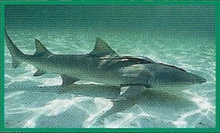This fish is constantly trying to hitch a ride. The remora uses a special sucking disk on its head to attach to sharks, whales, sea turtles and manta rays. It does this so it can snag scraps of leftover food from its host; in return the remora cleans its host of parasites. People sometimes use remoras as an unusual live fishing lure, and have even made up superstitions about them.
Suction Cup: The top of the remora's head is flat and ridged with a suction disk, which is actually a modified dorsal fin. The fish attaches the disk to the body of larger creatures. The remora can end up traveling long distances it couldn't swim by itself.
Don't Eat Me!: A remora has never been found in a shark's stomach, indicating that sharks don't eat them. But a remora was once found inside a shark's jaws-alive and clinging to the roof of the shark's mouth.
Helpful Hitchhikers[]

This shark easily travels through the ocean with the remora as an extra passenger on board.
The remora isn't just along for the ride when it latches onto a shark or a whale. It actually earns its keep. The fish's jaws are angled upward so it can scrape its sharp, curved teeth against the skin of its host. This doesn't hurt the host, but it cleans it, peeling parasites off its body and keeping the animal healthy. Sometimes the remora does try to grab a little extra food-when its host drops a scrap from its prey, the remora detaches itself and darts forward to scoop it up, then re-attaches to the host.
Dung Fish: Some species of remora seem to be lazy, and don't bother to clean off the hosts to which they attach themselves. Instead, these species wait for the host to relieve itself and feed on the waste.
Good Bait: The remora's sucking disk creates such a strong hold that native tribes use remoras to catch bigger fish. They attach a line to a remora's tail, wait for the fish to attach itself to a host, then carefully reel in the bigger fish.
Legendary Fish[]
Remoras have been known for thousands of years. Ancient Romans thought these fish had magical powers, and even blamed them for the death of the emperor Caligula (left). They claimed remoras attached themselves to his ship to slow it down so enemies could catch up and attack. This is how the fish got its name, which means, "to hold back."
Trivia[]
- This is one of the few purely saltwater fish not included in Monsters of the Deep, along with Barracudas, Sea Lamprey, Stingrays, Mudskipper, Seahorses, Leafy Sea Dragon, Flying Fish, and Clownfish.
- This card is the highest numbered fish card in the collection.

